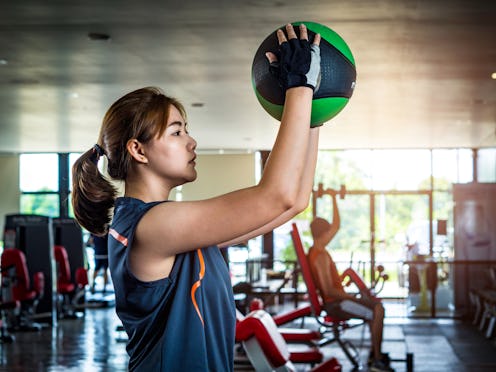Life
The One Question To Ask Yourself Before You Try A New Workout

Around the New Year, people often dive into resolutions committing themselves to “exercising more.” Especially following the food-shaming of the holidays, it’s important to remember that this goal is often influenced by the false notion that you have to “earn your food” through exercise. As a personal trainer, I know how deeply this pervasive shaming impacts people's workout goals. So if a renewed commitment to exercise plays any role in your January, there’s an important question to ask yourself about why you’re really working out.
“Would I still like this or want to do this if it wasn't going to change my body, my appearance, or my weight?” asks registered dietician Brenna O'Malley, founder of The Wellful. While there’s nothing wrong with having goals related to your body, O’Malley says it’s crucial to ask this question whenever you’re diving into new forms of exercise. The honest answer can help you make sure you’re maintaining a relationship with exercise, food, and your body that emphasizes long-term sustenance and happiness rather than a concept of bodily shame and punishment that’s based on toxic diet culture.
O’Malley says that the answer to this question might not be as simple as you think at first blush. “Sometimes we don't even realize that we're doing something with these underlying goals” of changing our external appearance, “and what we’re doing might not be as enjoyable or really what we want to be doing as much.” When you’re answering this question, you might find that the kind of exercise you’re doing might be so unenjoyable to you — or damaging to your self-image, or both — that it’s doing more harm than good.
It’s OK to have wants for your body’s aesthetics — I know I’m chasing broader shoulders while I’m powerlifting as part of my desires as a transmasculine person — but it’s just as important to be honest with yourself about exercise in all its dimensions. When I’m powerlifting, I am not miserable the entire time in pursuit of a vague future with an imagined physique. There are many day-to-day aspects of powerlifting that I love — like the discipline and the self-reliance, the planning and the consistency and the fears, joys, exhilarations, and adrenaline rushes of being under a very heavy barbell. I can’t imagine how miserable I would be lifting every day if I didn’t love those things, regardless of what changes the exercise may induce in my body.
Thinking about your relationship with exercise in this multi-dimensional way — rather than reducing it only to the imagined effect it will have on your external appearance — can help you develop a more self-supportive and sustaining relationship with working out, O’Malley says. When exercise gets reduced to the amount of calories it burns, for example, “we miss all of the other benefits that come with working out, like mood and mental health benefits, helping to reduce stress, and all of those longevity benefits, and just being able to carry in your groceries.” Plus, doing workouts you don't want to [do] over and over again can just make you miserable, which isn't going to be good for your mental health.
If you have specific goals for your body, that’s great. But being honest with yourself about these goals by answering O’Malley’s question — would I be doing this workout if I didn’t think it would change my appearance? — can help bring more actual joy to exercising. It’s OK if the answer is “no” sometimes, of course — powerlifters rarely want to do our cardio, for example — but if the answer is “no” all the time, you might want to reassess how you’re working out and why.
Finding genuine joy in the process is so important to developing a great relationship between your body and mind, whether that means replacing traditional workouts with jungle gym-style play or grabbing your puppy for a long walk instead of hitting the weight room. No matter how you work out — or don’t — you always deserve to feel valid and real in your body. Asking yourself O’Malley’s question can be a great first step toward validating yourself for what you want in the future and what you love doing now.
Experts:
Brenna O’Malley, RD, founder, The Wellful LLC
This article was originally published on